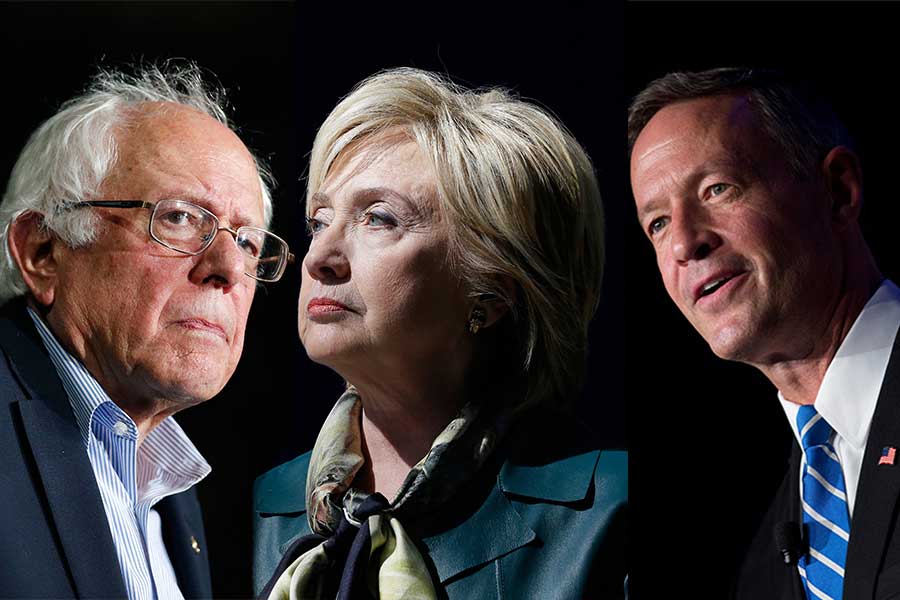
As Democratic candidates gathered for the first 2016 Presidential debate, divisions within party leadership over the debate plan have broken into public view.
Hawaii Rep. Tulsi Gabbard, a vice chair of the party, said in an interview Tuesday with TIME that party chair Debbie Wasserman-Schulz had shown “poor judgement” with her heavy-handed leadership and debate strategy.
Earlier this week, Wasserman Schultz encouraged Gabbard to stay away from debate in Vegas because of disagreements over how many debates Democrats should stage. “We’re the Democratic Party,” Gabbard continued. “We should be representing democratic values and allowing for debate both within our party and amongst our member and officers.”
Gabbard, who is one of five vice-chairs of the Democratic National Committee, has openly criticized the party’s policy of restricting the number of debates to six.
The New York Times first reported Gabbard’s claim that after appearing on television days before the first contest criticizing the debate schedule, Wasserman Schultz disinvited her from the debate. Gabbard said in her interview with TIME that Wasserman Schultz’s staff had called her staff, telling her she was no longer invited to the CNN-hosted contest in Las Vegas.
The debates, Gabbard told TIME, are “not something people should play politics with.” The DNC disagreed with Gabbard’s assessment.
“The focus of the debate in Nevada as well as the other debates and forums in the coming weeks should be on the candidates who will take the stage, and their vision to move America forward,” Holly Shulman, national press secretary for the DNC said in a statement to TIME. “All that was asked of Ms. Gabbard’s staff was to prioritize our candidates and this important opportunity they have to introduce themselves to the American people.”
Wasserman Schultz said Tuesday that she reached out to Gabbard multiple times after the initial exchange to discuss attending the Las Vegas debate.
The controversy over the number of debates has widened in recent months after it became clear that Wasserman Schultz unilaterally made the decision to limit the number of debates. The party has come under fire from the progressive base, as well as candidates Vermont Sen. Bernie Sanders and former Maryland Gov. Martin O’Malley.
Wasserman Schultz and others have defended the debate schedule, saying it has been necessary to limit the number of debates in order to prevent the schedule from over burdening the candidates. There were over twenty debates in 2008. The DNC also points to the Republicans’ rules, which limit the number of debates to nine.
The interview with Gabbard below has been edited and condensed for clarity.
TIME: What happened between you and DNC chair Wasserman Schultz?
Representative Tulsi Gabbard: Last week I was on MSNBC publicly calling for more debates, as I have been for several weeks. Debbie Wasserman Schultz’s chief of staff called mine and delivered a message saying, ‘We heard her on MSNBC, she’s continuing to disagree and therefore Debbie doesn’t feel she should come to the debate.’
What are your concerns about the debate schedule?
Really, this goes to the heart of the whole issue here, which is about democracy and freedom of speech. People’s ability to participate in the democratic process is something I take very seriously. These aren’t things that people should take lightly and it’s not something people should play politics with.
There’s a bigger issue here than me missing the debate. The bigger issue is the unilateral decision that the chairwoman made with regard to our presidential candidates: setting the policy of not only limiting the schedule to six debates, but the policy of retribution that if you participate in debates not sanctioned, then you’ll be punished. That’s a problem.
Do you think DWS penalizing chairs similar to issue of limiting debate?
Both decisions are examples of poor judgment on her part. We’re the Democratic Party. We should be representing democratic values and allowing for debate both within our party and amongst our member and officers and debate and disagreements opening up more opportunities for American people to be informed and engaged.
This situation with the debates in particular and the fact that it was made unilaterally without communicating or consulting with us. As a vice chair, I can say there was no meeting of the officers of DNC to go through this important and decision before it was made. This is a particularly problematic issue because it goes to the very heart of democratic values and what we are supposed to be working for as a party, and within our democracy.
You’re watching the debate remotely, then?
It’ll be interesting to see how the debate goes. This will be a good example of why we’ll need more opportunities to engage with the candidates.
More Must-Reads from TIME
- Why Trump’s Message Worked on Latino Men
- What Trump’s Win Could Mean for Housing
- The 100 Must-Read Books of 2024
- Sleep Doctors Share the 1 Tip That’s Changed Their Lives
- Column: Let’s Bring Back Romance
- What It’s Like to Have Long COVID As a Kid
- FX’s Say Nothing Is the Must-Watch Political Thriller of 2024
- Merle Bombardieri Is Helping People Make the Baby Decision
Contact us at letters@time.com